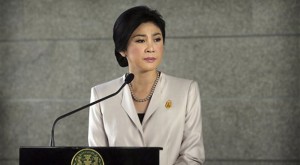Prime Minister Yingluck Shinawatra summoned by anti-graft panel
BANGKOK — Thailand’s prime minister has been summoned to face an anti-corruption panel Thursday to hear negligence charges that could lead to her removal from office, following months of mass opposition protests.
Prime Minister Yingluck Shinawatra, who has protested her innocence, is expected to send a lawyer to represent her at the hearing into alleged corruption in her government’s flagship rice farm subsidy scheme.
She said last week that she was “willing to cooperate to establish the facts”.
Yingluck flew to her political stronghold in northern Thailand on Wednesday where she is expected to spend several days inspecting government-backed projects.
The National Anti-Corruption Commission (NACC), which summoned Yingluck, says she ignored warnings that the rice scheme was fostering corruption and causing financial losses.
Article continues after this advertisementIf found guilty she could face a five-year ban from politics.
Article continues after this advertisementNACC commissioner Vicha Mahakhun told Agence France-Presse on the eve of the hearing that Yingluck’s lawyer had informed the panel he would represent the premier to acknowledge the charges.
It is unclear how long the commission will take to reach a conclusion.
If the panel decides that Yingluck is guilty, the case will be referred to the partially elected upper house of parliament for an impeachment vote.
Opposition protesters, who have occupied parts of the capital for nearly four months, want Yingluck to step aside in favour of an unelected “people’s council” to tackle what they see as corruption and a culture of money-driven politics.
A wave of political violence, often targeting protesters, has left 22 people dead and hundreds wounded, with almost daily reports of gunshots and grenade blasts in the capital recently.
The demonstrators accuse Yingluck’s elder brother Thaksin Shinawatra — a billionaire tycoon-turned-premier who was ousted from office by royalist generals in 2006 — of running the government from overseas, where he lives to avoid a jail term for corruption.
Critics say the subsidy scheme, which guarantees farmers above-market rates for rice, has encouraged corruption, drained the public coffers and left the country with a mountain of unsold stock.
But government supporters see the charges as part of an attempted “judicial coup” by Thaksin’s opponents within the royalist establishment, at a time of anxiety about the ailing health of revered 86-year-old King Bhumibol Adulyadej.
RELATED STORIES
Defiant Thai PM rejects protest demands in national address
